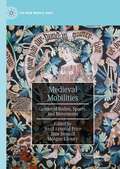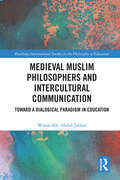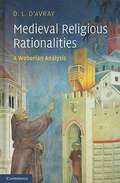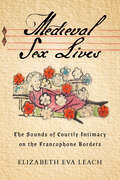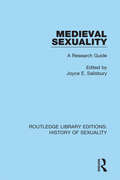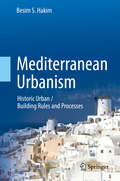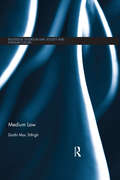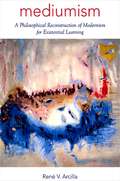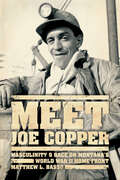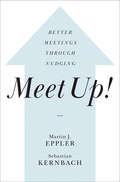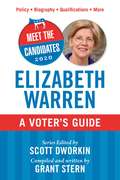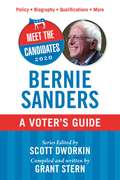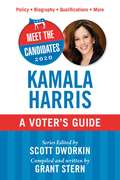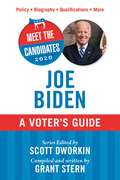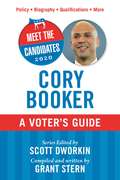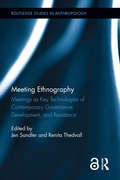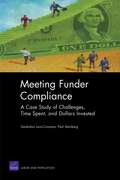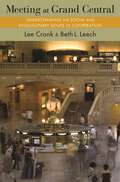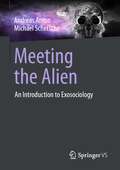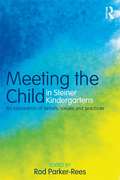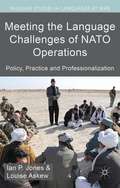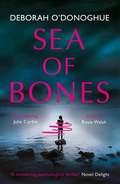- Table View
- List View
Medieval Mobilities: Gendered Bodies, Spaces, and Movements (The New Middle Ages)
by Basil Arnould Price Jane Bonsall Meagan KhouryThis collection explores the intersection of gender and mobility across the Global Middle Ages. Medieval Mobilities questions how medieval people, texts, images, and ideas move across physiological, geographical, literary, and spiritual boundaries. In what ways do these movements afford new configurations of gender, sexuality, and being? Enacting a dialogue between medieval studies, feminist thought, and queer theory, Medieval Mobilities proposes that attending to the undulations of premodern gender and sexuality may help destabilize unstated assumptions about ways of being and loving in the Middle Ages. This volume also brings together emergent and established scholars to challenge an increasingly static academy and instead envision a scholarly practice focused on intergenerational, international, and interdisciplinary collaboration. Drawing upon wide range of primary sources and theoretical frameworks, the resultant essays unsettle the imagined fixity of gender and propose alternative conceptualizations of embodiment, identity, and difference in the medieval world.
Medieval Muslim Philosophers and Intercultural Communication: Towards a Dialogical Paradigm in Education (Routledge International Studies in the Philosophy of Education)
by Wisam Kh. Abdul-JabbarThis book examines the works of Medieval Muslim philosophers interested in intercultural encounters and how receptive Islam is to foreign thought, to serve as a dialogical model, grounded in intercultural communications, for Islamic and Arabic education. The philosophers studied in this project were instructors, tutors, or teachers, such as Al-Kindi, Al-Farabi, Al-Ghazali, and Averroes, whose philosophical contributions directly or indirectly advanced intercultural learning. The book describes and provides examples of how each of these philosophers engaged with intercultural encounters, and asks how their philosophies can contribute to infusing intercultural ethics and practices into curriculum theorizing. First, it explores selected works of medieval Muslim philosophers from an intercultural perspective to formulate a dialogical paradigm that informs and enriches Muslim education. Second, it frames intercultural education as a catalyst to guide Muslim communities’ interactions and identity construction, encouraging flexibility, tolerance, deliberation, and plurality. Third, it bridges the gap between medieval tradition and modern thought by promoting interdisciplinary connections and redrawing intercultural boundaries outside disciplinary limits. This study demonstrates that the dialogical domain that guides intercultural contact becomes a curriculum-oriented structure with Al-Kindi, a tripartite pedagogical model with Al-Fārābī, a sojourner experience with Al-Ghazali, and a deliberative pedagogy of alternatives with Averroes. Therefore, the book speaks to readers interested in the potential of dialogue in education, intercultural communication, and Islamic thought research. Crucially bridging the gap between medieval tradition and modern thought by promoting interdisciplinary connections and redrawing intercultural boundaries outside disciplinary limits, it will speak to readers interested in the dialogue between education, intercultural communication, and Islamic thought. .
Medieval Religious Rationalities: A Weberian Analysis
by D. L. D'AvrayInspired by the social theories of Max Weber, David d'Avray asks in what senses medieval religion was rational and, in doing so, proposes a new approach to the study of the medieval past. Applying ideas developed in his companion volume on Rationalities in History, he explores how values, instrumental calculation, legal formality and substantive rationality interact and the ways in which medieval beliefs were strengthened by their mutual connections, by experience, and by mental images. He sheds new light on key themes and figures in medieval religion ranging from conversion, miracles and the ideas of Bernard of Clairvaux to Trinitarianism, papal government and Francis of Assisi's charismatic authority. This book shows how values and instrumental calculation affect each other in practice and demonstrates the ways in which the application of social theory can be used to generate fresh empirical research as well as new interpretative insights.
Medieval Sex Lives: The Sounds of Courtly Intimacy on the Francophone Borders
by Elizabeth Eva LeachMedieval Sex Lives examines courtly song as a complex cultural product and social force in the early fourteenth century, exploring how it illuminates the relationship between artistic production and the everyday lives of the elites for whom this music and poetry was composed and performed. In a focused analysis of the Oxford Bodelian Library's Douce 308 manuscript—a fourteenth-century compilation that includes over five hundred Old French lyrics composed over two centuries alongside a narrative account of elaborate courtly festivities centered on a week-long tournament—Elizabeth Eva Leach explores two distinct but related lines of inquiry: first, why the lyric tradition of "courtly love" had such a long and successful history in Western European culture; and, second, why the songs in the Bodleian manuscript would have been so important to the book's compilers, owners, and readers. The manuscript's lack of musical notation and authorial attributions make it unusual among Old French songbooks; its arrangement of the lyrics by genre invites inquiry into the relationship between this long musical tradition and the emotional and sexual lives of its readers. Combining an original account of the manuscript's contents and their likely social milieu with in-depth musical and poetic analyses, Leach proposes that lyrics, whether read or heard aloud, provided a fertile means of propagating and enabling various sexual scripts in the Middle Ages. Drawing on musicology, literary history, and the sociology and psychology of sexuality, Medieval Sex Lives presents a provocative hypothesis about the power of courtly songs to model, inspire, and support sexual behaviors and fantasies.
Medieval Sexuality: A Research Guide (Routledge Library Editions: History of Sexuality #6)
by Joyce E. SalisburyOriginally published in 1990. Well-annotated bibliographical entries cover works on history, religion, medicine, philosophy, law and literature in western Europe from about the third century A.D. through the end of the medieval period. The primary sources are organised thematically, and separately from secondary sources. Languages covered include English, Spanish, Portuguese, French, German, Italian, and Latin. The focus is on sexuality and sexual attitudes, not on the related topics of marriage and family. Detailed indexes are also included.
Medikalisierung und Soziale Arbeit
by Thomas Schübel Boris FrieleDer Sammelband beleuchtet Medikalisierungsprozesse speziell mit Blick auf deren Relevanz für die Soziale Arbeit. Als Medikalisierung wird die kritisch zu hinterfragende Umdeutung lebensweltlicher Problemlagen und sozialer Konflikte in medizinisch relevante Störungen verstanden. Die Beiträge beleuchten theoretisch oder empiriebezogen, in welcher Weise die Soziale Arbeit als Profession und Disziplin mit Medikalisierungsprozessen konfrontiert ist und wie sie diesen theoretisch und handlungsbezogen begegnen kann.
Mediterranean Urbanism
by Besim S. HakimThis book brings together historic urban / building rules and codes for the geographic areas including Greece, Italy and Spain. The author achieved his ambitious goal of finding pertinent rules and codes that were followed in previous societies for the processes that formed the built environment of their towns and cities, including building activities at the neighborhood level and the decision-making process that took place between proximate neighbors. The original languages of the texts that were translated into English are Greek, Latin, Italian, Arabic and Spanish. The sources for the chapter on Greece date from the 2nd century B. C. E. to the 19th century C. E. Those for the chapter on Italy date from the 10th to the 14th centuries C. E. and for the chapter on Spain from the 5th to the 18th centuries C. E. Numerous appendices are included to enhance and elaborate on the material that make up the chapters. This book provides lessons and insights into how compact and sustainable towns and cities that are greatly admired today were achieved in the past and how we and future generations can learn from this rich heritage, including the valuable insight provided by the nature of the rules and codes and their application through centuries of continuous use.
Medium Law (Routledge Studies in Law, Society and Popular Culture)
by Daithí Mac SíthighWhy should anyone care about the medium of communication today, especially when talking about media law? In today’s digital society, many emphasise convergence and seek new regulatory approaches. In Medium Law, however, the ‘medium theory’ insights of Harold Innis, Marshall McLuhan and the Toronto School of Communication are drawn upon as part of an argument that differences between media, and technological definitions, continue to play a crucial role in the regulation of the media. Indeed, Mac Síthigh argues that the idea of converged, cross-platform, medium-neutral media regulation is unattainable in practice and potentially undesirable in substance. This is demonstrated through the exploration of the regulation of a variety of platforms such as films, games, video-on-demand and premium rate telephone services. Regulatory areas discussed include content regulation, copyright, tax relief for producers and developers, new online services, conflicts between regulatory systems, and freedom of expression. This timely and topical volume will appeal to postgraduate students and postdoctoral researchers interested in fields such as Law, Policy, Regulation, Media Studies, Communications History, and Cultural Studies.
Mediumism: A Philosophical Reconstruction of Modernism for Existential Learning
by René V. ArcillaMediumism considers what the modernist movement in the arts could mean for us today. It examines how artists and critics, particularly in the visual arts, responded to the growth of industries of distraction since the nineteenth century by creating new kinds of artworks that stress their mediums. René V. Arcilla draws out the metaphysical and ethical implications of the work of critics Clement Greenberg, T. J. Clark, and Michael Fried from a perspective rooted in existentialism. He finds in the resulting moral orientation a way to understand the distinctive purpose of liberal education and its political resistance to consumerism. Eschewing terminology that would be familiar to only one set of specialists, the book aims to be accessible to a general audience as well as to readers interested in modernist art, cultural politics, existentialist philosophy, and the philosophical principles of liberal education.
Medizinische Psychologie und Soziologie (Springer-Lehrbuch)
by Hermann Faller Hermann LangDieses Buch gibt einen Überblick über sämtliche theoretischen und methodischen Grundlagen der Psychologie und der Soziologie, die für die Arzt-Patient-Beziehung von Bedeutung sind. Die Situation des Patienten zu verstehen und adäquat auf ihn einzugehen, steht dabei im Zentrum. Besondere medizinische Situationen wie zum Beispiel aus der Onkologie, Palliativmedizin, Sexualmedizin und Intensivmedizin werden ebenso beleuchtet wie die Anamnese und Untersuchung. Das bewährte didaktische Konzept macht das Lernen leicht: - Alle Themen aus dem GK sind enthalten, die wichtigen Prüfungsinhalte sind hervorgehoben. - Der Text ist klar und einfach geschrieben und übersichtlich aufgebaut. - Lernziele am Kapitelbeginn geben einen Überblick über das, was hängen bleiben soll. - Definitionen, klinische Beispiele, Übersichten und Zusammenfassungen zum Wiederholen der wichtigsten Begriffe helfen beim Verstehen und Lernen. - Und für die weiter Interessierten bieten die Exkurse und die kommentierten Literaturhinweise einen guten Einstieg.
Medizinische Soziologie in Deutschland: Entstehung und Entwicklungen (Gesundheit und Gesellschaft)
by Johannes Siegrist Alf Trojan Ulrich StößelDer Band soll ein Bild der Medizinischen Soziologie in Deutschland vermitteln: Entstehung, Themen, Einbettung in den Kontext der benachbarten Fächer und Versorgungsforschung. Dabei wird auf die Anfänge zurückgeblickt; der Schwerpunkt der Beiträge liegt jedoch auf aktuellen wissenschaftlichen Ergebnissen im jeweiligen Themenbereich.
Meet Joe Copper: Masculinity and Race on Montana's World War II Home Front
by Matthew L. BassoOC I realize that I am a soldier of production whose duties are as important in this war as those of the man behind the gun. OCO So began the pledge that many home front men took at the outset of World War II when they went to work in the factories, fields, and mines while their compatriots fought in the battlefields of Europe and on the bloody beaches of the Pacific. The male experience of working and living in wartime America is rarely examined, but the story of men like these provides a crucial counter-narrative to the national story of Rosie the Riveter and GI Joe that dominates scholarly and popular discussions of World War II. In "Meet Joe Copper," Matthew L. Basso describes the formation of a powerful, white, working-class masculine ideology in the decades prior to the war, and shows how it thrivedOCoon the job, in the community, and through union politics. Basso recalls for us the practices and beliefs of the first- and second-generation immigrant copper workers of Montana while advancing the historical conversation on gender, class, and the formation of a white ethnic racial identity. "Meet Joe Copper" provides a context for our ideas of postwar masculinity and whiteness and finally returns the men of the home front to our reckoning of the Greatest Generation and the New Deal era.
Meet Up!: Better Meetings Through Nudging
by Martin J. Eppler Sebastian KernbachThis book is about meetings and providing a new perspective from behavioural economics called nudging to make meetings more productive and enjoyable. Nudging hacks into the fast, automatic, subconscious system in human reasoning to breed success in every get-together. Once you know the foundations of focus, orientation, involvement, and commitment, the advantages of nudging are evident. The authors provide an explanation of nudge theory and 6 principles of how nudging affects our behavior. Examples from the actions and choices of the Dalai Lama, Ray Dalio, and Barack Obama demonstrate how nudging can make a difference. Based on theory, the book also gives 100 very practical nudges to improve meeting productivity that can be used by any meeting leader or participant.
Meet the Candidates 2020: A Voter's Guide (Meet the Candidates 2020)
by Scott Dworkin Grant SternGet informed about the campaign issues and policies of Democratic candidate Elizabeth Warren, the populist, progressive, definitively capitalist senator from Massachusetts.Meet the Candidates 2020: Elizabeth Warren: A Voter’s Guide will help you decide quickly if Warren deserves your vote for the Democratic nomination and to take on Donald Trump for president of the United States. Warren’s strong economic background sets her apart; the senator from Massachusetts defines herself as a capitalist first and seeks to make capitalism more equitable for all. She has already proposed sweeping anti-corruption reforms, refused PAC donations to her campaign, rolled out plans for college debt forgiveness and a tax on the super wealthy. Her background as a Harvard economist, author of TheTwo-Income Trap, and experience as an economic advisor to Barack Obama positions her well to make change happen. Warren’s campaign also features popular Democratic talking points—rebuilding the middle class, ending corruption in Washington, making voting laws more democratic, bringing our troops home and stopping endless war—but it’s her experience that sets her apart. From working the campaign trial for Hillary Clinton to weathering President Trump’s refrain of “Pocahontas” in reference to her claimed Native American heritage, Meet the Candidates 2020: Elizabeth Warren: A Voter’s Guide is your complete handbook to Elizabeth Warren’s resumé, campaign, and what America would look like if she won the presidency in 2020.The Meet the Candidates 2020 series is the informed voter’s guide to making a decision in the 2020 Democratic primary and presidential election. Each book gives an unbiased, political insider’s analysis of each contender, featuring: candidate interviews; an introduction by campaign advisor, Democratic Coalition co-founder, and Dworkin Report host Scott Dworkin; and compilation and writing by Occupy Democrats Editor at Large Grant Stern. In two hours of reading, you’ll understand their defining characteristics, credentials, campaign issues, challenges, presidential chances, and everything else you need to know to decide who should challenge Donald Trump. Whether it’s for Elizabeth Warren, Joe Biden, Bernie Sanders, Kamala Harris, Julian Castro, Cory Booker, or another, Meet the Candidates is what you need to make an informed vote for president in 2020.
Meet the Candidates 2020: A Voter's Guide (Meet the Candidates 2020)
by Scott Dworkin Grant SternWhat is “democratic socialism?" Educate yourself on Bernie Sanders, the liberal independent from Vermont and the 2016 underdog turned 2020 Democratic favorite. Bernie Sanders shocked the establishment in 2016 with his self-described “political revolution,” mobilizing grassroots fundraising and campaigning to nearly secure the Democratic nomination over Hillary Clinton (even in the face of Democratic National Convention opposition). The Vermont senator and longest-serving independent in congressional history hopes to do the same with a better result in 2020. Meet the Candidates 2020: Bernie Sanders: A Voter’s Guide will help you decide if Sanders’s brand of democratic socialism is for you and if he is the right candidate to take on Donald Trump.A vocal critic of Donald Trump, Sanders advocates for sweeping reform: single-payer, universal health care, labor and economic inequality reform, taxes on the wealthy, the Green New Deal, marijuana legalization, free higher education. Sanders has had an undeniable influence on how campaigns are run and has moved the Democratic party to the left, but how will his liberal platforms play in a Democratic primary and against Trump in a general election? After reading Meet the Candidates 2020: Bernie Sanders: A Voter’s Guide you’ll be able to analyze those chances, explain his positions, and decide if they are what you believe is right for America. The Meet the Candidates 2020 series is the informed voter’s guide to making a decision in the 2020 Democratic primary and presidential election. Each book gives an unbiased, political insider’s analysis of each contender, featuring: candidate interviews; an introduction by campaign advisor, Democratic Coalition co-founder, and Dworkin Report host Scott Dworkin; and compilation and writing by Occupy Democrats Editor at Large Grant Stern. In two hours of reading, you’ll understand their defining characteristics, credentials, campaign issues, challenges, presidential chances, and everything else you need to know to decide who should challenge Donald Trump. Whether it’s for Elizabeth Warren, Joe Biden, Bernie Sanders, Kamala Harris, Julian Castro, Cory Booker, or another, Meet the Candidates is what you need to make an informed vote for president in 2020.
Meet the Candidates 2020: A Voter's Guide (Meet the Candidates 2020)
by Scott Dworkin Grant SternKamala Harris is already a contender to take on Donald Trump despite still refining her positions. Learn what makes the lawyer, legislator, and progressive Democrat a strong candidate.Meet the Candidates 2020: Kamala Harris: A Voter’s Guide is your handbook to understanding the candidacy of Kamala Harris and deciding if she deserves your vote in the Democratic primary, and ultimately to take on Donald Trump in the 2020 presidential election.The senator, former prosecutor, and attorney general from California has gained momentum after a strong national showing at the Kavanaugh hearings. She is a strong voice in the Senate, and serves on the Homeland Security and Governmental Affairs Committee, the Select Committee on Intelligence, the Committee on the Judiciary, and the Committee on the Budget. While she is still refining her campaign stances, she has voiced support for gun control, the Green New Deal, lowering middle class taxes, DREAMers, net neutrality, and legalizing marijuana. Meet the Candidates 2020: Kamala Harris: A Voter’s Guide examines how her campaign will solidify, the type of leader she’ll be, and her chances versus Donald Trump in the general election.The Meet the Candidates 2020 series is the informed voter’s guide to making a decision in the 2020 Democratic primary and presidential election. Each book gives an unbiased, political insider’s analysis of each contender, featuring: candidate interviews; an introduction by campaign adviser, Democratic Coalition co-founder, and Dworkin Report host Scott Dworkin; and compilation and writing by Occupy Democrats Editor at Large Grant Stern. In two hours of reading, you’ll understand their defining characteristics, credentials, campaign issues, challenges, presidential chances, and everything else you need to know to decide who should challenge Donald Trump. Whether it’s for Elizabeth Warren, Joe Biden, Bernie Sanders, Kamala Harris, Julian Castro, Cory Booker, or another, Meet the Candidates is what you need to make an informed vote for president in 2020.
Meet the Candidates 2020: A Voter's Guide (Meet the Candidates)
by Grant SternIs Joe Biden the right Democrat to face Trump in 2020? Decide by reading this guide to his policies, accomplishments as vice president to Barack Obama, and complicated past as a Congressman. Even before he decided to run, Joe Biden was the most popular Democratic candidate for president in 2020. On the heels of serving as vice president, and close friend, to Barack Obama, Biden’s resume and likability position the former Congressman from Delaware as the favorite for the nomination. He holds s strong lead in the polls.But Joe Biden’s legacy is much more complicated. He chaired the Foreign Relations and Senate Judiciary Committees, but his treatment of Anita Hill in the Clarence Thomas Supreme Court hearings will be a black mark on his candidacy. He oversaw successful Great Recession relief and the Violence Against Women Act and ultimately received the Presidential Medal of Freedom, but the racial statements from his past will reflect poorly when promoted by Republicans and fellow Democratic candidates. And Biden has faced allegations of inappropriate touching by several women. Meet the Candidates 2020: Joe Biden: A Voter’s Guide will explore these contradictions and help you decide if Biden is your choice for 2020. The Meet the Candidates 2020 series is the informed voter’s guide to making a decision in the 2020 Democratic primary and presidential election. Each book gives an unbiased, political insider’s analysis of each contender, featuring: candidate interviews; an introduction by campaign advisor, Democratic Coalition co-founder, and Dworkin Report host Scott Dworkin; and compilation and writing by Occupy Democrats Editor at Large Grant Stern. In two hours of reading, you’ll understand their defining characteristics, credentials, campaign issues, challenges, presidential chances, and everything else you need to know to decide who should challenge Donald Trump. Whether it’s for Elizabeth Warren, Joe Biden, Bernie Sanders, Kamala Harris, Pete Buttigieg, Cory Booker, or another, Meet the Candidates is what you need to make an informed vote for president in 2020.
Meet the Candidates 2020: A Voter's Guide (Meet the Candidates)
by Grant SternA primer on the policies and candidacy of the Democratic senator from New Jersey, who has made social and racial justice his foundation. Is he the right Democrat to take on Trump?Cory Booker, New Jersey senator and former mayor of Newark, has a voting record measured a third most liberal in his time in the Senate. Meet the Candidates 2020: Cory Booker: A Voter’s Guide helps you understand exactly how liberal Booker is, where on the spectrum Booker sits among Democratic contenders for the presidency, and whether his positions are worthy of your vote.Booker, a voice for social progress and equality and a critic of President Trump, is campaigning on the platform of an end to the war on drugs and drug reform, single-payer healthcare, education reform, environmental reform and the Green New Deal, and criminal justice reform. He sits on the Committee on Environment and Public Works, Committee on Foreign Relations, and the Senate Committee on the Judiciary, where he emerged as a strong voice in the Kavanaugh hearings.The Meet the Candidates 2020 series is the informed voter’s guide to making a decision in the 2020 Democratic primary and presidential election. Each book gives an unbiased, political insider’s analysis of each contender, featuring: candidate interviews; an introduction by campaign adviser, Democratic Coalition co-founder, and Dworkin Report host Scott Dworkin; and compilation and writing by Occupy Democrats Editor at Large Grant Stern. In two hours of reading, you’ll understand their defining characteristics, credentials, campaign issues, challenges, presidential chances, and everything else you need to know to decide who should challenge Donald Trump. Whether it’s for Elizabeth Warren, Joe Biden, Bernie Sanders, Kamala Harris, Julian Castro, Cory Booker, or another, Meet the Candidates is what you need to make an informed vote for president in 2020.
Meeting Ethnography: Meetings as Key Technologies of Contemporary Governance, Development, and Resistance (Routledge Studies in Anthropology)
by Renita Thedvall Jen SandlerThis volume asks and addresses elusive ontological, epistemological, and methodological questions about meetings. What are meetings? What sort of knowledge, identities, and power relationships are produced, performed, communicated, and legitimized through meetings? How do—and how might—ethnographers study meetings as objects, and how might they best conduct research in meetings as particular elements of their field sites? Through contributions from an international group of ethnographers who have conducted “meeting ethnography” in diverse field sites, this volume offers both theoretical insight and methodological guidance into the study of this most ubiquitous ritual.
Meeting Funder Compliance
by Paul Steinberg Sandraluz Lara-CinisomoFunders financially support nonprofit organizations to further mutual goals of implementing programs and providing services; as such, nonprofits must meet certain compliance requirements. This case study, the first of its kind, examines the management processes of one nonprofit as it strives to meet funder compliance requirements, and presents recommendations and survey instruments to assess and improve the quality and efficiency of these processes.
Meeting at Grand Central: Understanding the Social and Evolutionary Roots of Cooperation
by Beth L. Leech Lee CronkA revolutionary approach to the study of cooperation that unites evolutionary biology and the social sciencesFrom the family to the workplace to the marketplace, every facet of our lives is shaped by cooperative interactions. Yet everywhere we look, we are confronted by proof of how difficult cooperation can be—snarled traffic, polarized politics, overexploited resources, social problems that go ignored. The benefits to oneself of a free ride on the efforts of others mean that collective goals often are not met. But compared to most other species, people actually cooperate a great deal. Why is this?Meeting at Grand Central brings together insights from evolutionary biology, political science, economics, anthropology, and other fields to explain how the interactions between our evolved selves and the institutional structures we have created make cooperation possible. The book begins with a look at the ideas of Mancur Olson and George Williams, who shifted the question of why cooperation happens from an emphasis on group benefits to individual costs. It then explores how these ideas have influenced our thinking about cooperation, coordination, and collective action. The book persuasively argues that cooperation and its failures are best explained by evolutionary and social theories working together. Selection sometimes favors cooperative tendencies, while institutions, norms, and incentives encourage and make possible actual cooperation.Meeting at Grand Central will inspire researchers from different disciplines and intellectual traditions to share ideas and advance our understanding of cooperative behavior in a world that is more complex than ever before.
Meeting the Alien: An Introduction to Exosociology
by Andreas Anton Michael SchetscheIs mankind alone in the universe? Will we ever encounter intelligent life beyond Earth? These questions have been asked for centuries. Recent advances in the fields of astrophysics, astronomy and astrobiology make it more likely than ever before, that Earth may not be the only inhabited planet, and that humanity may not the only intelligent species in the universe. What would be the consequences of contact with an extraterrestrial intelligence? This question is at the heart of the emerging discipline of exosociology. According to the authors, first contact with an extraterrestrial intelligence poses enormous risks for humanity. These risks come not only from extraterrestrials, but above all from ourselves. We should be prepared. Michael Schetsche and Andreas Anton's comprehensive introduction to exosociology was first published in German in 2019. The book has been widely acclaimed in Germany and internationally. It is now available in English for the first time.
Meeting the Child in Steiner Kindergartens: An Exploration of Beliefs, Values and Practices
by Rod Parker-ReesWhat can early years practitioners learn from Steiner kindergartens? What is distinctive about Steiner kindergarten teachers’ ways of getting to know children? As demands for accountability in Early Years settings continue to grow, external pressure to assess children and to measure their progress can disrupt the development of informal and intimate relationships between teachers and children. The contributors to this book, who include both experienced Steiner educators and early childhood experts from other backgrounds, have worked together to explore and understand what is distinctive about Steiner kindergarten practice. They present a variety of perspectives on the ways in which kindergarten teachers’ practices, values and beliefs can help children to find and construct their own identities, through play and through engagement in the life of their community. The authors explore key aspects of Steiner kindergarten practice, including caring for the physical environment, establishing rhythms and routines for children’s activity, and providing times and spaces in which teachers and children can get to know each other. By meeting with children and teachers, through rich accounts of day to day life in kindergartens and through accounts of the values and principles which inform their practice, readers will be encouraged to question and reflect on their own approaches to observation and assessment.
Meeting the Language Challenges of NATO Operations
by Ian P. JonesAfter 40 years of Cold War, NATO found itself intervening in Bosnia-Herzegovina, Kosovo and Afghanistan, where the ability to communicate with local people was essential to the success of the missions. This book explains how the Alliance responded to this challenge so as to ensure that the missions did not fail through lack of understanding.
Meetings: Smart Skills (Smart Skills)
by Patrick ForsythPart of the Smart Skills Series Meetings offers all you need to know to get the most out of meetings - from setting meetings up, leading them, to how to make the most out of them once the meeting is over. A must for any employee, manager, freelancer of business owner. The book offers proven, practical advice on: setting objectives and creating practical agendas; deciding who should attend and when and where; effective chairing and effective participation - the communications skills necessary - listening, observing, questioning and getting your points across; dealing with problems; follow up after the meeting to prompt suitable action.
